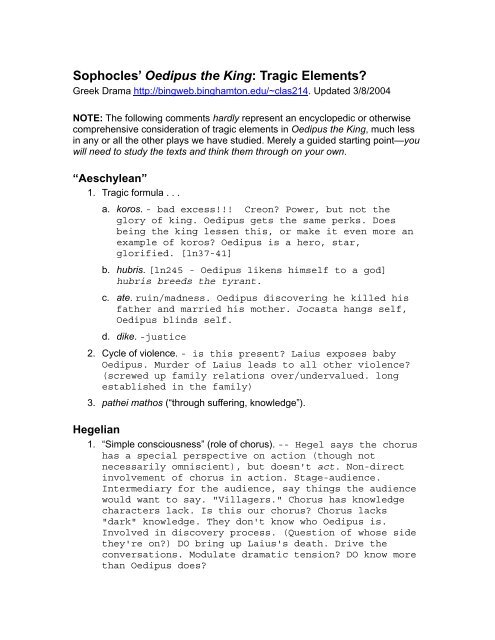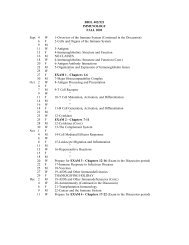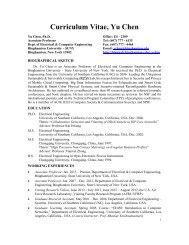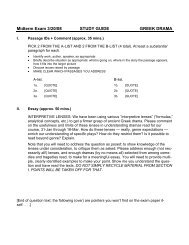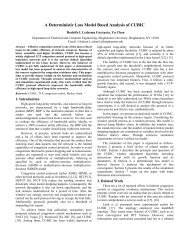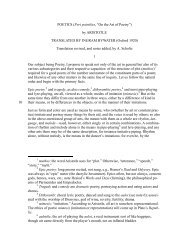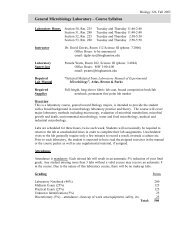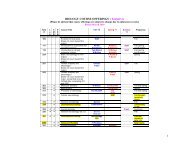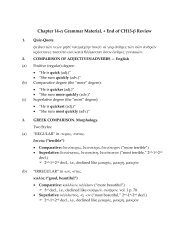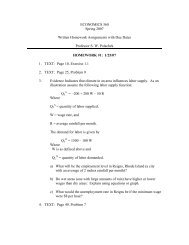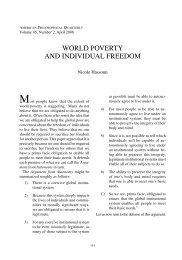Oedipus the King: Tragic Elements? - Harvey.binghamton.edu
Oedipus the King: Tragic Elements? - Harvey.binghamton.edu
Oedipus the King: Tragic Elements? - Harvey.binghamton.edu
You also want an ePaper? Increase the reach of your titles
YUMPU automatically turns print PDFs into web optimized ePapers that Google loves.
Sophocles’ <strong>Oedipus</strong> <strong>the</strong> <strong>King</strong>: <strong>Tragic</strong> <strong>Elements</strong><br />
Greek Drama http://bingweb.<strong>binghamton</strong>.<strong>edu</strong>/~clas214. Updated 3/8/2004<br />
NOTE: The following comments hardly represent an encyclopedic or o<strong>the</strong>rwise<br />
comprehensive consideration of tragic elements in <strong>Oedipus</strong> <strong>the</strong> <strong>King</strong>, much less<br />
in any or all <strong>the</strong> o<strong>the</strong>r plays we have studied. Merely a guided starting point—you<br />
will need to study <strong>the</strong> texts and think <strong>the</strong>m through on your own.<br />
“Aeschylean”<br />
1. <strong>Tragic</strong> formula . . .<br />
a. koros. - bad excess!!! Creon Power, but not <strong>the</strong><br />
glory of king. <strong>Oedipus</strong> gets <strong>the</strong> same perks. Does<br />
being <strong>the</strong> king lessen this, or make it even more an<br />
example of koros <strong>Oedipus</strong> is a hero, star,<br />
glorified. [ln37-41]<br />
b. hubris. [ln245 - <strong>Oedipus</strong> likens himself to a god]<br />
hubris breeds <strong>the</strong> tyrant.<br />
c. ate. ruin/madness. <strong>Oedipus</strong> discovering he killed his<br />
fa<strong>the</strong>r and married his mo<strong>the</strong>r. Jocasta hangs self,<br />
<strong>Oedipus</strong> blinds self.<br />
d. dike. -justice<br />
2. Cycle of violence. - is this present Laius exposes baby<br />
<strong>Oedipus</strong>. Murder of Laius leads to all o<strong>the</strong>r violence<br />
(screwed up family relations over/undervalued. long<br />
established in <strong>the</strong> family)<br />
3. pa<strong>the</strong>i mathos (“through suffering, knowledge”).<br />
Hegelian<br />
1. “Simple consciousness” (role of chorus). -- Hegel says <strong>the</strong> chorus<br />
has a special perspective on action (though not<br />
necessarily omniscient), but doesn't act. Non-direct<br />
involvement of chorus in action. Stage-audience.<br />
Intermediary for <strong>the</strong> audience, say things <strong>the</strong> audience<br />
would want to say. "Villagers." Chorus has knowledge<br />
characters lack. Is this our chorus Chorus lacks<br />
"dark" knowledge. They don't know who <strong>Oedipus</strong> is.<br />
Involved in discovery process. (Question of whose side<br />
<strong>the</strong>y're on) DO bring up Laius's death. Drive <strong>the</strong><br />
conversations. Modulate dramatic tension DO know more<br />
than <strong>Oedipus</strong> does
2. “Individual pathos” (role of characters) . . . -- characters are<br />
embodiments of imperatives at odds with each o<strong>the</strong>r.<br />
Hegel reading acknowledges <strong>the</strong> <strong>Oedipus</strong>. <strong>Oedipus</strong> is an<br />
internal dialectic.<br />
[Instructor's note, Hegel on <strong>Oedipus</strong>: seeming internal<br />
contradiction of justice based on un-chosen<br />
circumstances versus personal responsibility. <strong>Oedipus</strong><br />
must reconcile self to his fate - accept who he is.<br />
This will carry over into <strong>Oedipus</strong> at Colonus - sort of<br />
"delayed syn<strong>the</strong>sis"]<br />
a. <strong>the</strong>sis. -- an argument. [1]<strong>Oedipus</strong> has a duty to <strong>the</strong><br />
polis and must remedy <strong>the</strong> pollution in his town.<br />
[2]fortune. [3] <strong>Oedipus</strong> trying to escape fate. [4]<br />
fate uttered by Oracle.<br />
b. anti<strong>the</strong>sis. -- counterargument to <strong>the</strong>sis. [1]<strong>Oedipus</strong> was<br />
<strong>the</strong> killer and <strong>the</strong> one who polluted <strong>the</strong> town.<br />
[2]fate. [3] The Fates. [4]Laius/<strong>Oedipus</strong> can control<br />
fate.<br />
c. syn<strong>the</strong>sis. -- SEE HEGEL READING pp. 71 ff. "Syn<strong>the</strong>sis"<br />
= a resolution of contradictions (<strong>the</strong>sis versus<br />
anti<strong>the</strong>sis) such that a higher understanding is<br />
reached. syn<strong>the</strong>sis does not mean "compromise" or<br />
"common ground." it means a harmonious combination<br />
of <strong>the</strong> two ideas, a way of seeing whereby opposed<br />
imperatives, when placed in perspective, cease to<br />
conflict - a world accommodating both an Antigone<br />
and a Creon (i.e., a realization that society cannot<br />
function unless <strong>the</strong> imperatives of both household<br />
and state are honored).<br />
To quote http://www.connect.net/ron/hegel.html:<br />
"The <strong>the</strong>sis . . . might be an idea or a historical<br />
movement. Such an idea or movement contains within<br />
itself incompleteness that gives rise to opposition,<br />
or an anti<strong>the</strong>sis, a conflicting idea or movement. As<br />
a result of <strong>the</strong> conflict a third point of view<br />
arises, a syn<strong>the</strong>sis, which overcomes <strong>the</strong> conflict by<br />
reconciling at a higher level <strong>the</strong> truth contained in<br />
both <strong>the</strong> <strong>the</strong>sis and anti<strong>the</strong>sis."<br />
syn<strong>the</strong>sis in OK is a bit of a puzzle, even after<br />
you've read Hegel. it seems to revolve around <strong>the</strong><br />
conflict between willed action and unwilled action -<br />
<strong>the</strong> fact that we are held accountable for both. As
an internal conflict, we can see <strong>the</strong> drama of it<br />
played out in <strong>the</strong> transformation of <strong>Oedipus</strong> on<br />
stage: it seems to have to with his attitude<br />
vis-à-vis his own actions. There is, <strong>the</strong>n, as with<br />
<strong>the</strong> Antigone, much overlap between this internal<br />
dialectic and <strong>the</strong> play's main conflicts, which, to<br />
one degree or ano<strong>the</strong>r, play out in <strong>the</strong> psyche of <strong>the</strong><br />
main character. but resolution is not, acc. to<br />
Hegel, reached on OK but in <strong>Oedipus</strong> at Colonus,<br />
which we shall soon read.<br />
Aristotelian<br />
1. muthos-plot . . .<br />
a. simple versus complex -- simple plot has NEIHTER<br />
recognition NOR reversal. Complex has one or <strong>the</strong><br />
o<strong>the</strong>r or both. Complex is "better." <strong>Oedipus</strong> is…<br />
complex. Recognition - <strong>Oedipus</strong> recognizes himself as<br />
<strong>the</strong> killer. People recognize <strong>the</strong> holes in <strong>Oedipus</strong>'s<br />
feet = <strong>Oedipus</strong> was <strong>the</strong> son of Laius. Jocasta<br />
recognizes that she's married to her son (does she<br />
know). [A WHOLE BUNCH OF THESE] Reversal - <strong>Oedipus</strong><br />
goes from searcher to "search-ee." -- In <strong>Oedipus</strong><br />
<strong>King</strong>, to recognize is to make a reversal, in this<br />
play.<br />
b. episodic<br />
2. ethos-inner nature.<br />
3. Complication, resolution.<br />
4. hamartia-error. -- error in <strong>the</strong> way <strong>Oedipus</strong> handles himself<br />
as ruler False move as a result of character (ethos).<br />
Just exile vs. heaps curses upon <strong>the</strong> murderer of<br />
Laius. free will act (Even in a universe where things<br />
are fated)<br />
5. anagnorisis-recognition. [see 1a]<br />
6. peripeteia-reversal. [see 1a]<br />
7. Catharsis.<br />
8. General, “poetic” truths (superior to particular truths of historical narrative,<br />
section 9 page 11).


